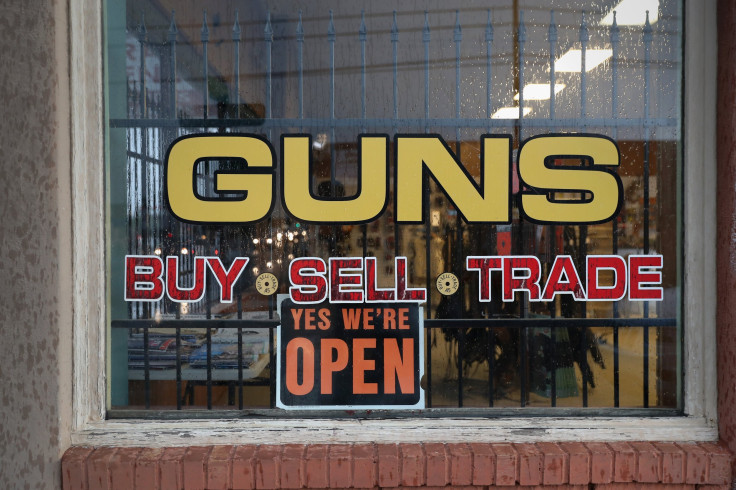Gun Control Laws 2016: California, Washington, Nevada, Maine Ballots Focus On Background Checks, Access Rights In November Election

Americans will head to the polls in droves to pick their next president on Nov. 8, but other than the national election, there are a number of statewide ballot measures that could alter specific laws by circumventing legislatures. There will be 162 measures on ballots across the country this year, up slightly from 158 during 2014’s midterm elections, according to figures compiled by Ballotpedia.org.
In particular, four states (California, Maine, Nevada, and Washington) have ballot measures aimed at tightening gun control and rights laws and three of the four measures largely calls for requiring background checks for private purchases. One measure also calls for temporarily limiting firearm access to those deemed mentally ill by a judge based on the concerns of a family member, roommate, or significant other.
Deals between private parties like family members or friends, rather than through licensed dealers, were left unchecked in the Brady Bill, the federal legislation that went into effect in 1994.
A Pew Research Center study published in August 2015 said 85 percent of Americans favor “expanded” background checks and the support extends across political party affiliations, with 88 percent of Democrats and 79 percent of Republicans in favor.
Still, at the state level, there is real and reasonable opposition to expanding background checks, both from private citizens and interests groups, and law enforcement.
Each of the four measures detailed below could have California, Maine, Nevada, and Washington join the 18 other states that have increased the scope of required background checks by varying degrees, or would leave existing laws untouched.
Here’s a synopsis of each measure, including recent polls and input from both proponents and opponents.
California
Asking voters to vote “yes” or “no,” the initiative proposed by California lieutenant governor Gavin Newsom, called Proposition 63, specifically addresses large-capacity ammunition and magazines and gun sales. The measure would have ammunition sales fall in line with how guns are already sold in California, making it the first state to do so if passed. It calls for would-be buyers to provide identification and pass a background check that will look for previous felony convictions, restraining orders, history of mental illness, and violent misdemeanors.
Gun and ammo sellers would also have to register for licenses to sell ammo, and magazines capable of holding more than 10 rounds would be banned.
A Field/IGS Poll conducted early last month showed 60 percent of likely voters support Prop 63, while 30 percent were against it and 10 percent were undecided, according to the San Jose Mercury News.
The chairman of the California Police Chiefs Association, Rudy Escalante, wrote in an op-ed piece published by the Sacramento Bee Wednesday that Prop 63 would make the work of law enforcement more difficult. Among other points made by Escalante, Prop 63 does make failing to report the theft or loss of a gun a crime, which he believes is a major deterrent, and that the initiative could also put officers who may have to confiscate guns in danger.
Maine
In the state's background checks for gun sales measure, referred to as "Question 3," the initiative specifically addresses private sales and requires background checks prior to a sale between parties who are not licensed dealers. In the event that neither seller nor buyer is licensed, they would have to go to a licensed dealer, who would run a background check on the buyer, in order to complete the purchase. A background check could even be required if a Maine resident loans a gun, rather than sells it.
It’s that last wrinkle driving some of the opposition to Question 3. Sportsmen, in particular, find the measure cumbersome when it comes to “transfers,” as the executive director of the Sportsman’s Alliance of Maine, David Trahan, said in a piece for the Bangor Daily News on Wednesday. He pointed out that loaning a gun to a friend who intends to hunt, would require a background check for the initial loan and then another check for the transfer back to the actual owner, and that a second violation under the initiative (resulting in a felony charge and “loss of firearm rights forever”) essentially goes too far.
However, there are exemptions to the initiative. Transfers to family members and some temporary loans could still be legal.
Nevada
Nevada’s "Question 1" is very similar to that of Maine’s initiative. It too would require private sales and gun transfers to pass through a licensed dealer, but temporary transfers or those to family members would also be exempt. Currently, Nevada does not require background checks for deals made between unlicensed would-be buyers and sellers.
Much of the debate over Question 1 has to do with former New York City Mayor Michael Bloomberg’s involvement in the matter. The Las Vegas Review-Journal came out against the measure in an op-ed last week and specifically wrote Bloomberg “has devoted a chunk of his personal fortune to advance a gun control agenda,” while pointing out that current Nevada governor Brian Sandoval is against Question 1 and questioned whether the initiative would even have an effect on crime.
Still, results of a poll conducted by The Review-Journal earlier this month showed 54 percent of likely voters support Question 1, while 38 percent were against it and 8 percent were undecided.
Washington
Dubbed "Initiative 1491" and proposed by the Alliance for Gun Responsibility, the potential measure comes on the heels of Washington’s successful 2014 campaign to require background checks for all gun sales and transfers, and would create “extreme-risk protection orders.”
Essentially, judges would be empowered to issue such an order on an individual that would temporarily prevent them from purchasing a gun. The crux of the measure’s text reads: “This act is designed to temporarily prevent individuals who are at high risk of harming themselves or others from accessing firearms by allowing family, household members, and police to obtain a court order when there is demonstrated evidence that the person poses a significant danger, including danger as a result of a dangerous mental health crisis or violent behavior.”
Opponents of Initiative 1491 say it denies individuals due process and say it’s definition of “family” and “household member” is too vague, according to local CBS affiliate KIMA-TV.
© Copyright IBTimes 2024. All rights reserved.











